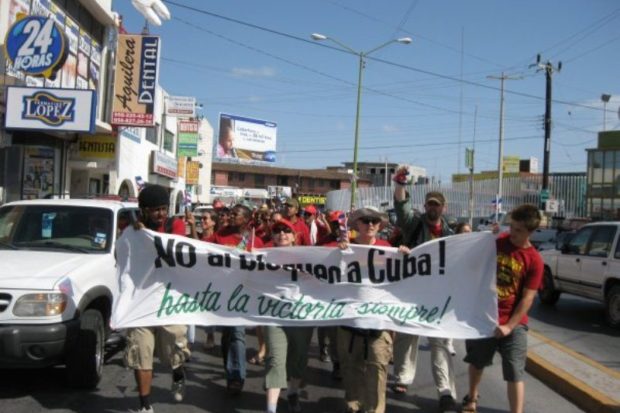
On July 7, a school bus will roll into Fresno, more than half stuffed with cargo, but with a few seats remaining, with windows wide open for cooling and colorful artwork showing its mission―the Pastors for Peace Caravan to Cuba. Local residents, including Gerry Bill on his sixth Caravan and Leni Reeves on her third, will get on the bus joining many other Caravanistas on 12 buses traveling through Canada and the United States.
What moves these people? Is the time coming when you’ll want to get on the bus and go see Cuba for yourself?
The send-off event is July 7 at Margaret Hudson’s Barn, 4247 N. Thorne Ave. in Fresno, from 6 p.m. to 9 p.m., with a potluck supper, entertainment, speakers and an opportunity to talk with these Caravanistas. Often people start with curiosity: Why does our government forbid travel to Cuba? What is it we’re not supposed to see?
Those with an interest in Cuba know that the U.S. government maintains a trade embargo on Cuba, which we also try to enforce on other countries. This blockade has caused suffering in Cuba. It uses denial of food, medicine and essential supplies as a political weapon.
Most Caravanistas feel that it is our duty as citizens and human beings to oppose this policy and to try to do something, however small, to alleviate the suffering caused by it. The goals of the Caravan are to deliver material aid as solidarity, not charity, and to demonstrate and enact an alternative foreign policy, an attempt at a just and moral policy based on mutual respect.
What actually happens on the Caravan? People travel through Canada and the United States―this bus, one of many, will work its way through California and the Southwest―collecting aid and participants at various stops, with events at each stop explaining the Caravan. We sleep on the bus or at the stops, typically in churches.
All the buses converge in McAllen, Texas, where we unite as a group that can work well together and learn about our endeavor: history, tactics and what to expect on the border crossings and in Cuba. We also unload, repack and re-invoice and reload all the aid. This is a lot of work in the Texas sun.
The border crossing varies from year to year, though large numbers of guards from various agencies and Caravanistas’ need for alertness and nonviolent resistance are a constant. Recently, the U.S. border authorities have attempted to seize computers. One year, Gerry Bill was among those who walked a computer across the international bridge, foiling the border guards. Next, we and the buses go to Tampico where we load the aid onto cargo containers for shipment, tidy up our buses, which are also donated―our bus from last year went to Abali Maternity and Infant Hospital―and get on a plane for Cuba.
The Cuba experiences also vary from year to year but are sure to include a visit to the Latin American School of Medicine (ELAM), where 12,000 students from more than 27 countries, including the United States, are trained to serve the medical needs of poor people in their own countries. Attending an ELAM graduation is a moving experience, seeing the students who have worked and sacrificed for six years sharing their joy and willingness to serve. Scholarships are available and checking out ELAM is another reason that prospective students come on the Caravan.
The Cubans are eager to inform and entertain us and to show their accomplishments, so the schedule is packed, both in Havana and the provinces. Many people participate in a short work project at an organic farm or garden; Cuban agriculture is mostly organic. Music and dance, history and economics, youth groups, neighborhood projects, museums and the beach―all of this and more are likely to be part of the Cuba experience.
We stay in church dorms and eat what we’re given, so it isn’t luxury travel. It isn’t necessary to be a “pastor” or even religious in any way, but it helps to be relaxed, tolerant and enduring. Our hard work and endurance seem small beside that of the Cubans, which is humbling.
We travel to Cuba as a conscious act of civil disobedience and as a challenge to the U.S. government’s cruel and immoral blockade of Cuba. By taking a moral stand and openly challenging the blockade, we urge the U.S. people and government to change this law. That is why the Pastors for Peace Caravan is important. Not so much because of the aid we take, though that is significant and needed, but because it is a statement, “I’m sorry that my government is trying to starve and deprive people to force them to give up their efforts to make a better society. I disagree and I’m trying to change that policy.”
If you have aid to donate, contact Gerry Bill at gerry.bill@gmail.com or Leni Reeves at 559-855-4511. Wheelchairs are especially needed. For more information on Pastors for Peace, visit www.pastorsforpeace.org; you may also donate through the Web site. Donations are tax-deductible. Checks should be made out to Pastors for Peace. And please come to send us off on July 7.
